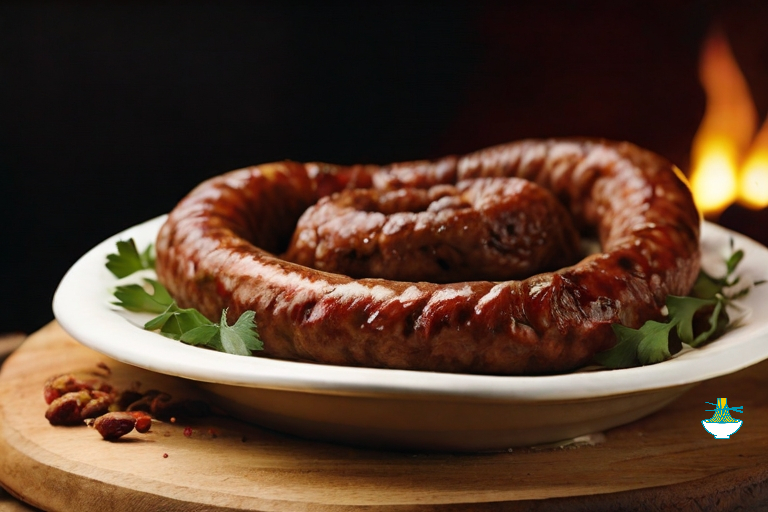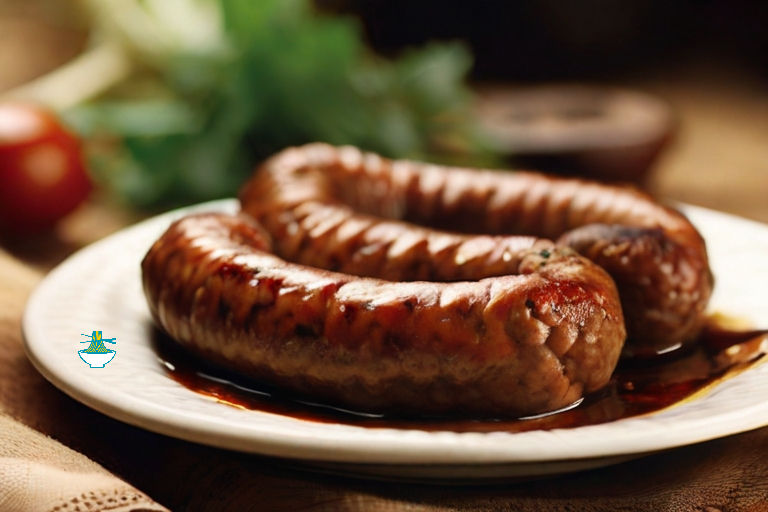Welcome to a culinary journey through the heart of Southern Africa, where vibrant flavors and rich traditions converge to create the mouthwatering delight known as Botswana Boerewors. Boerewors, a proudly South African sausage, has found a unique expression in the kitchens of Botswana, blending local ingredients and culinary techniques to craft a dish that captures the essence of the region.
In this recipe, we will guide you through the steps to create your own Botswana Boerewors, a delectable sausage that embodies the warmth of Botswana's hospitality and the boldness of its cuisine. The blend of spices, the choice of meats, and the meticulous preparation process all contribute to the distinctive taste that makes Botswana Boerewors a cherished dish. Get ready to embark on a culinary adventure and experience the authentic flavors of Botswana right in your own kitchen.
Ingredients:
- 2 pounds (about 900g) beef, finely minced
- 1/2 pound (about 225g) pork fat, finely minced
- 2 teaspoons coriander seeds, toasted and crushed
- 2 teaspoons cumin seeds, toasted and crushed
- 1 teaspoon ground allspice
- 1 teaspoon ground nutmeg
- 1 teaspoon paprika
- 1 teaspoon dried thyme
- 1 teaspoon salt
- 1/2 teaspoon black pepper
- 2 tablespoons vinegar (malt or red wine vinegar)
- 1/4 cup ice water
- Hog casings, soaked and rinsed
Instructions:
Prepare the Casings:
1-Soak hog casings in warm water for about 30 minutes to soften.
2-Rinse the casings thoroughly to remove any salt.
Toast and Crush Spices:Toast coriander and cumin seeds in a dry skillet over medium heat until fragrant. Crush them using a mortar and pestle or a spice grinder.
Mix the Meat and Fat:In a large mixing bowl, combine the finely minced beef, pork fat, and crushed spices.
Add the Seasonings:Add ground allspice, nutmeg, paprika, dried thyme, salt, and black pepper to the meat mixture.
Incorporate the Wet Ingredients:Pour in the vinegar and ice water. Mix well until the ingredients are evenly distributed.
Prepare the Sausage Mixture:Pass the meat mixture through a meat grinder or a food processor with a fine grinding attachment.
Stuff the Casings:
1-Thread the hog casings onto a sausage stuffer, leaving a small overhang.
2-Stuff the casings with the sausage mixture, making sure to avoid air pockets. Twist the sausage into links of your desired size.
Allow Flavors to Develop:Place the sausages in the refrigerator for at least 12 hours to allow the flavors to meld.
Cooking Options:
1-Grill: Cook the Boerewors on a preheated grill, turning occasionally until browned and cooked through.
2-Oven: Bake in a preheated oven at 375°F (190°C) for about 25-30 minutes or until cooked through.
3-Pan-fry: Cook in a skillet over medium heat until browned on all sides and cooked through.
Serve and Enjoy:Serve the Botswana Boerewors hot off the grill or out of the oven. Enjoy this flavorful sausage with your favorite sides, a slice of bread, or traditional South African accompaniments like chakalaka or tomato and onion relish.
Now, savor the authentic taste of Botswana with your homemade Boerewors!
Nutritional Values
Providing precise nutritional values for homemade recipes can be challenging due to variations in specific ingredients and preparation methods. However, I can offer general estimates based on standard nutritional information for these ingredients. Keep in mind that these values are approximate and may vary based on specific brands and variations in the recipe:
Nutritional Values (Per Serving, assuming 10 servings):
Beef (2 pounds):
- Calories: 1900 kcal
- Protein: 200g
- Fat: 120g
- Carbohydrates: 0g
benefits:
- Rich source of high-quality protein, essential for muscle growth and repair.
- Provides iron, zinc, and B-vitamins, supporting overall health and energy metabolism.
Pork Fat (1/2 pound):
- Calories: 1800 kcal
- Protein: 0g
- Fat: 200g
- Carbohydrates: 0g
benefits:
- Adds flavor and moisture to the sausage.
- Contains monounsaturated and saturated fats, providing a source of energy.
Coriander Seeds (2 teaspoons):
- Calories: 12 kcal
- Protein: 0.4g
- Fat: 0.7g
- Carbohydrates: 2.1g
benefits:
- Contains antioxidants and may have anti-inflammatory properties.
- A source of dietary fiber, aiding digestion.
Cumin Seeds (2 teaspoons):
- Calories: 16 kcal
- Protein: 0.8g
- Fat: 0.9g
- Carbohydrates: 2g
benefits:
- May promote digestion and reduce bloating.
- Contains antioxidants and has potential anti-inflammatory effects.
Allspice (1 teaspoon):
- Calories: 6 kcal
- Protein: 0.1g
- Fat: 0.3g
- Carbohydrates: 1.6g
benefits:
- Rich in antioxidants, including quercetin and eugenol.
- May have anti-inflammatory and antimicrobial properties.
Nutmeg (1 teaspoon):
- Calories: 12 kcal
- Protein: 0.1g
- Fat: 0.9g
- Carbohydrates: 0.6g
Paprika (1 teaspoon):
- Calories: 6 kcal
- Protein: 0.3g
- Fat: 0.3g
- Carbohydrates: 1.2g
benefits:
- Contains essential oils with potential health benefits.
- Provides small amounts of essential minerals like copper and iron.
Dried Thyme (1 teaspoon):
- Calories: 3 kcal
- Protein: 0.1g
- Fat: 0.1g
- Carbohydrates: 0.6g
benefits:
- Contains essential oils with potential antibacterial properties.
- Provides vitamins like vitamin K and vitamin C.
Salt (1 teaspoon):
- Calories: 0 kcal
- Protein: 0g
- Fat: 0g
- Carbohydrates: 0g
benefits:
- Essential for maintaining electrolyte balance in the body.
- Enhances flavor and acts as a natural preservative.
Black Pepper (1/2 teaspoon):
- Calories: 3 kcal
- Protein: 0.1g
- Fat: 0.1g
- Carbohydrates: 0.6g
benefits:
- Contains piperine, which may enhance nutrient absorption.
- May have antioxidant and anti-inflammatory properties.
Vinegar (2 tablespoons):
- Calories: 2 kcal
- Protein: 0g
- Fat: 0g
- Carbohydrates: 0g
benefits:
- Adds acidity, enhancing flavor and aiding in the preservation process.
- May have potential antimicrobial properties.
Ice Water (1/4 cup):
- Calories: 0 kcal
- Protein: 0g
- Fat: 0g
- Carbohydrates: 0g
benefits:
- Maintains the temperature during the mixing process.
- Helps achieve the desired texture in the sausage.
Hog Casings:
- Calories: Varies (negligible)
- Protein: Varies (negligible)
- Fat: Varies (negligible)
- Carbohydrates: Varies (negligible)
benefits:
- Provides a natural casing for the sausage.
- Adds a traditional appearance and texture to the final product.
Please note that these values are approximations and may vary based on the specific ingredients and brands you use. Additionally, the nutritional values for hog casings are usually negligible and can be disregarded for practical purposes.


Comments